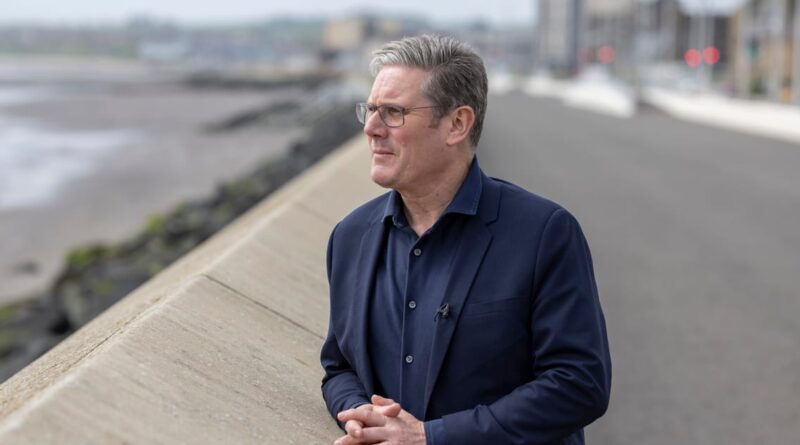How the Australian Labor Party taught Keir Starmer to fight dirty
LONDON — The history of the U.K. Labour Party is one of electoral failure. Only two of the party’s leaders have won general elections in the past 60 years.
But with Labour now in an unfamiliar position — streets ahead in the polls as a U.K. general election looms in 2024 — leader Keir Starmer is taking advice from his sister party in Australia, which won a famous victory of its own last year.
The advice from Down Under is simple — aim low and get personal if you want to win.
Starmer’s Labour has been happy to oblige.
“You win elections by using every tool in your toolbox — and we have now reached deep into the toolbox and pulled a few out that haven’t been dusted off in a while,” one shadow Cabinet minister said.
April’s local elections in England proved a testing ground for Labour’s new approach, with the party trialing a controversial ad accusing Prime Minister Rishi Sunak of being soft on sex offenders.
The simple social media graphic showed a beaming Sunak beside the words: “Do you think sex offenders should be locked up? RISHI SUNAK DOESN’T.”
The attack was underpinned by stats showing that 4,500 people found guilty of sexually assaulting children had avoided jail since 2010. The party used these figures to frame the prime minister personally as an apologist for pedophilia.
Unsurprisingly the ad elicited wall-to-wall media coverage for a sizeable chunk of the local election campaign, but some Labour shadow ministers and senior MPs voiced discomfort at the personal nature of the attack. The saga created an internal row in the party and was the cause of much chin stroking among the Westminster commentariat.
Our friends in the south
The new approach was inspired in part by Australian Labor, a dynamic which carries some irony, given the U.K. Tories have for years enjoyed links to center-right Australian strategists Lynton Crosby and his protégé Isaac Levido.
The Australian Labor Party won the country’s general election last year on the back of a campaign which was light on policy and heavy on personal attacks on ex-PM Scott Morrison.
Some senior political pundits decried the contest as a race to the bottom, with both sides whipping up false scare campaigns and engaging in personal attacks.
Morrison, for example, was consistently portrayed by the Labor Party as a liar and misogynist in a constant stream of advertisements.
The British Labour Party is now collaborating with its Australian counterpart to co-opt these more “ruthless” campaign tactics, a second shadow Cabinet minister confirmed.
This has included high-level meetings between Labour frontbenchers and Australian Prime Minister Anthony Albanese to discuss election strategies.
One ex-Australian Labor Party official told POLITICO that the British Labour Party had “much to learn” from its own “winning culture.”
But some fear the approach has gone too far — and that the local election ads handed a weapon to the Tories.
The campaign was described as “appalling” and “disgusting” by outraged Conservative MPs at the time, attracting comparisons to Boris Johnson’s false accusation that Starmer chose not to lock up Britain’s most notorious sex offender Jimmy Savile while the Labour leader was England’s director of public prosecutions.
Paul Burke, a writer and former advertising copywriter for Tony Blair’s Labour Party, told POLITICO the ad was “a mistake” and would never have happened in the lead-up to the 1997 election.
“They were a lot more professional and a lot more positive. Blair co-opted the feel good factor in the country at the time and managed to look visionary,” he said.
20 million clicks
But Labour officials told POLITICO the social media ad was clicked on around 20 million times, and was the most viewed digital post ever created by the party.
Multiple party officials and ministers said this response convinced the party’s head of campaigning, Morgan McSweeney, a close ally of Starmer, that Labour must be willing to embrace this kind of controversy to wound Sunak and the Tories.
“Being willing to swing a punch every now and then is no bad thing,” the first shadow Cabinet minister quoted above said. “When people take the fight to you, then you have to do something in return.”
Labour insiders also point to internal polling conducted after the April local elections to discover which parts of its campaign connected most with the public.
A party official said around one-quarter of people surveyed had noticed a major Starmer speech on crime, and roughly a third had seen Labour’s promise to freeze council tax for a year.
However, the sex offenders advert was by far the most visible aspect of the campaign — viewed by around 70 percent of voters.
“It was a bit of a trial run for us to see what worked. It was seen as a real success in the end and it didn’t cost us anything ” the Labour official said. “You have to remember that the party is really not used to this kind of thing, so there was a bit of hesitancy at first.”
“I would bet that this whole thing would have damaged the Conservatives more than us, even if some people were turned off by it,” a second Labour official said. “It got people talking about the party, which has not been easy.”
The second shadow Cabinet minister said they were surprised other members of the frontbench were so squeamish about the tactics.
“It didn’t bother me at all,” they said. “The Tories have real vulnerabilities on crime and they’ve been in power for 13 years — they can own it.”
Send in the clowns
However Ben Guerin, co-founder of the Topham Guerin advertising agency and architect of the Conservative Party’s 2019 digital advertising campaign, said that following Australian Labor’s example will only work if people understand what Labour stands for.
“Labour is clearly trying to signal to the media, Labour Party stakeholders and people around Keir that he’ll take a no-holds barred approach to the campaign,” he said.
“That’s fine, but they’re missing the other important elements. Where’s the comedy?
“Voters are also asking for political leaders to tell them a story for where the world is going and their place in it — I don’t think they’ve been able to communicate that.”
He also warned that Australia has “had its own flavor of politics for some time now” and that lessons from Labour’s antipodean friends may not necessarily translate to Britain’s political landscape.




